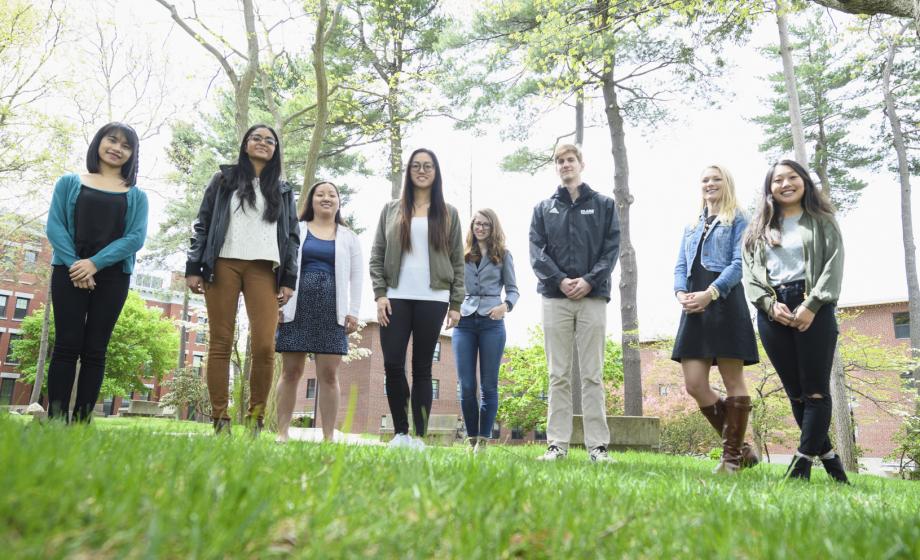Students unlock the secrets of marketing to millennials

Several Clark University management students headed off to their summer internships with major fashion retailers armed with fresh knowledge of millennials’ shopping habits, thanks to a marketing class they took this spring.
Although the students are millennials – members of the generation born from around 1980 to 2000 – they don’t have ready access to the demographic marketing data that might provide insight about their peers.
That’s where a new undergraduate marketing course, Consumer Behavior, comes in. The course was taught by Thomas Murphy, visiting assistant professor of marketing and management and a consultant to companies such as Avon, TJX Companies, Gillette, L.L. Bean and Godiva, as well as several universities in the Northeast.
“Sustainability marketing is taking off, and it’s one of the reasons why I get multiple requests to help companies with sustainable branding. So far, this survey is in a niche. And it’s great for Clark University to say we have one of the few databases that exists around consumer behavior regarding sustainable products, whether it’s coffee or personal products or clothing.”
Like most marketing professionals, Murphy is aware that millennials have buying power. After all, they became the largest living generation in 2016. “Millennial marketing” has become a buzz phrase as companies seek to woo the 75.4 million 19- to 35-year-olds who now outnumber Baby Boomers.
And who better to figure out how to win over millennials than their peers?
So Murphy turned to his students in Consumer Behavior and a graduate course, Branding Strategy, to tap into their base of friends and family. They used a survey tool he had developed for his clients. At the same time, they gained experience in assessing millennials’ brand loyalty and purchasing decisions and examining ways to market to them.
“Millennials are tough to pin down and tough to get a hold of to spend enough time on a survey. A lot of companies want more information about millennials, but it’s difficult to get them to answer,” Murphy says. “Starting next spring, I will teach three courses of over 100 students, each one getting 10 of their friends doing the survey. That’s over a thousand millennials.”
Rooted in the emerging field of sustainability marketing, the survey focuses on products and consumer trends benefiting the environment and society. Students polled millennials for L.L. Bean, asking about their purchasing decisions, brand loyalty and sustainability consciousness when shopping for clothing. The students drew from the survey, as well as their research into sustainable fashion, to develop presentations that Murphy forwarded to L.L. Bean’s marketing, branding and sustainability departments.

Next spring, students in Murphy’s Sustainability Marketing graduate course will contribute to the survey effort. Each year, he plans to involve a different client and market sector.
“Sustainability marketing is taking off, and it’s one of the reasons why I get multiple requests to help companies with sustainable branding,” Murphy says. “So far, this survey is in a niche. And it’s great for Clark University to say we have one of the few databases that exists around consumer behavior regarding sustainable products, whether it’s coffee or personal products or clothing.”
Nathalya Castro Argueta ’18, a management major and economics minor who took Consumer Behavior, found the survey results illuminating.
“The most surprising part of the survey for me was that millennials are willing to pay 10 percent more for sustainable clothing products,” Castro Argueta says. “I was very happy with this result because it tells you that our generation is becoming more concerned about the importance of taking care of the environment.”
Castro Argueta is interning this summer at TJX Companies, managing a warehouse team and assessing product supply and logistics for T.J. Maxx, in Worcester. She says Murphy’s course will help her after graduation as she pursues a career with an environmentally and socially conscious business.
“I learned the importance of valuing consumers, and how important is to create brand loyalty as a business. Brand loyalty goes beyond continuous purchases, it is what creates a consumer identity,” she says.
“Professor Murphy’s course on Consumer Behavior is the perfect combination for me – working in the business world and applying psychology. The course has taught me that you have to get a company to stand out through brand loyalty and transparency.”
Meanwhile, several students from Consumer Behavior are applying what they learned to their summer internships.
Isaac Smith ’18 has returned to his home state of Louisiana to work on millennial marketing and branding strategy for Haspel, a men’s sportswear and accessories company founded in New Orleans in 1909. The company originated the seersucker suit, which became fashionable for everyone from Ivy League preppies to Southern gentlemen.
“In my classes at Clark, I became increasingly interested in how the brain works and how that works in marketing – what makes people buy a certain brand,” says Smith, a psychology major and management minor who plans to apply to Clark’s fifth-year, accelerated Master of Science in Professional Communication Program. “Professor Murphy’s course on Consumer Behavior is the perfect combination for me – working in the business world and applying psychology. The course has taught me that you have to get a company to stand out through brand loyalty and transparency.”
Emilee Cocuzzo ’18, a management major and innovation and entrepreneurship minor, has found Murphy’s course useful for her strategic-planning internship at J.Jill.
“I’m learning about J.Jill’s customer segments, so it’s very relevant to what I learned in Consumer Behavior,” she says. “From this class, I can definitely say that you can segment customers in certain demographics and see very clear buying patterns.”
The course provided Kelly Rourke ’17 with insight into customers’ loyalty toward Lilly Pulitzer clothing, the subject of her senior honors thesis. A cultural studies and communication major and management minor, Rourke is headed into Clark’s fifth-year, accelerated Master of Business Administration Program this fall.
“I really like Professor Murphy’s style of teaching,” she says. “He does a good job of identifying the things that will be useful to use in our careers, instead of going by a textbook.”


